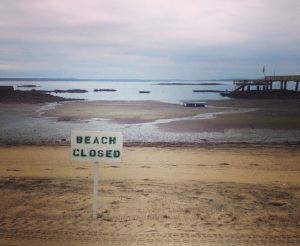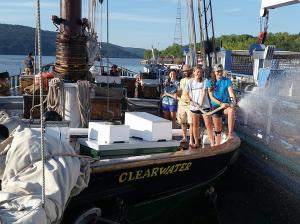
This summer, Save the Sound completed its second water quality monitoring season in Westchester County, NY. We could not have done it without the work of our volunteer water quality team!
To gain a better understanding of pollution sources in western Long Island Sound, we sampled at a variety of locations including harbors, open shoreline, beaches, and tributary rivers and creeks that feed the Sound.
Between July and September, we collected 172 water samples at 44 distinct sites. We had 15 volunteers this season, ranging from local high school students to retirees, including a dedicated group who accompanied us on sampling runs weekly, and on additional wet weather days. We are grateful to our volunteers for their hard work and support, and for helping us make this season a resounding success.
Talia Steiger, bacteria monitoring coordinator at Save the Sound, led the summer sampling program. She caught up with one of our sampling volunteers, Margaret (Maggie) Honig, to hear a reflection on her experience working with us. Read the brief interview below.
 Talia Steiger (TS): Hey Maggie, tell us a little about yourself.
Talia Steiger (TS): Hey Maggie, tell us a little about yourself.
Maggie Honig (MH): I’m 21 years old, from White Plains, New York. I grew up about 20 minutes from the Sound, and worked at Coveleigh Club in Rye as a lifeguard for three summers. I’m a senior at SUNY Binghamton, where I am majoring in Environmental Chemistry and minoring in French.
TS: How did you become involved with Save the Sound?
MH: In June I saw an article posted about the organization [opening an office in] Westchester on the LoHud website. I wanted to learn more about what the organization was doing, so I emailed Tracy Brown [Director of Save the Sound’s Western Long Island Sound program] and she told me that if I was interested I could volunteer as a citizen sampler.
TS: What is something new that you learned this summer doing water quality testing?
MH: I learned that precipitation events like heavy rain storms could adversely impact the quality of water. This is caused by stormwater runoff into the Sound. However, I also learned that certain beaches along the Sound have better water quality than we initially expected. For instance, as a lifeguard at the Coveleigh Club we often had to close the beach to swimmers after more than a quarter inch of rainfall had fallen. [This summer], we tested the water in that area before and after precipitation events. After seeing results from the bacterial tests we had performed I learned that the water at that beach for the most part did not exceed an established safe level of bacterial contamination.
TS: What do you hope to do after graduation? Do you think your experience with Save the Sound will have an impact on what you decide to do?
MH: After graduating from Binghamton, I plan on taking the GRE and applying to graduate schools. I’m interested in studying how pollution affects human health and in turn how we can reduce pollution.
TS: Why is protecting water quality important to you?

MH: I learned to swim when I was three years old, and competitively swam until I was 19. I have always loved the water and I hope that we can make all parts of the Sound swim-able. One of my best friends at school grew up on Long Island in Port Washington, which is farther south on the Sound than we are. She has never swum in the water near her house because the beach by her house is often closed due to high bacterial levels. Hopefully water quality will improve as we put more effort into cleaning up the Sound.
I also spent a week volunteering for Clearwater, an environmental education organization that sails a sloop along the Hudson River. From the late 1960s to today the water quality has dramatically improved in the Hudson and I believe that with effort we can do the same for the Sound.
TS: Would you volunteer with Save the Sound again?
MH: Definitely! I learned a lot about the Long Island Sound ecosystem this summer and met a bunch of really friendly and cool people while volunteering.
Until next summer! Thank you Maggie, and thanks to all of our volunteers!
Posted by Talia Steiger, bacteria monitoring coordinator for Save the Sound
